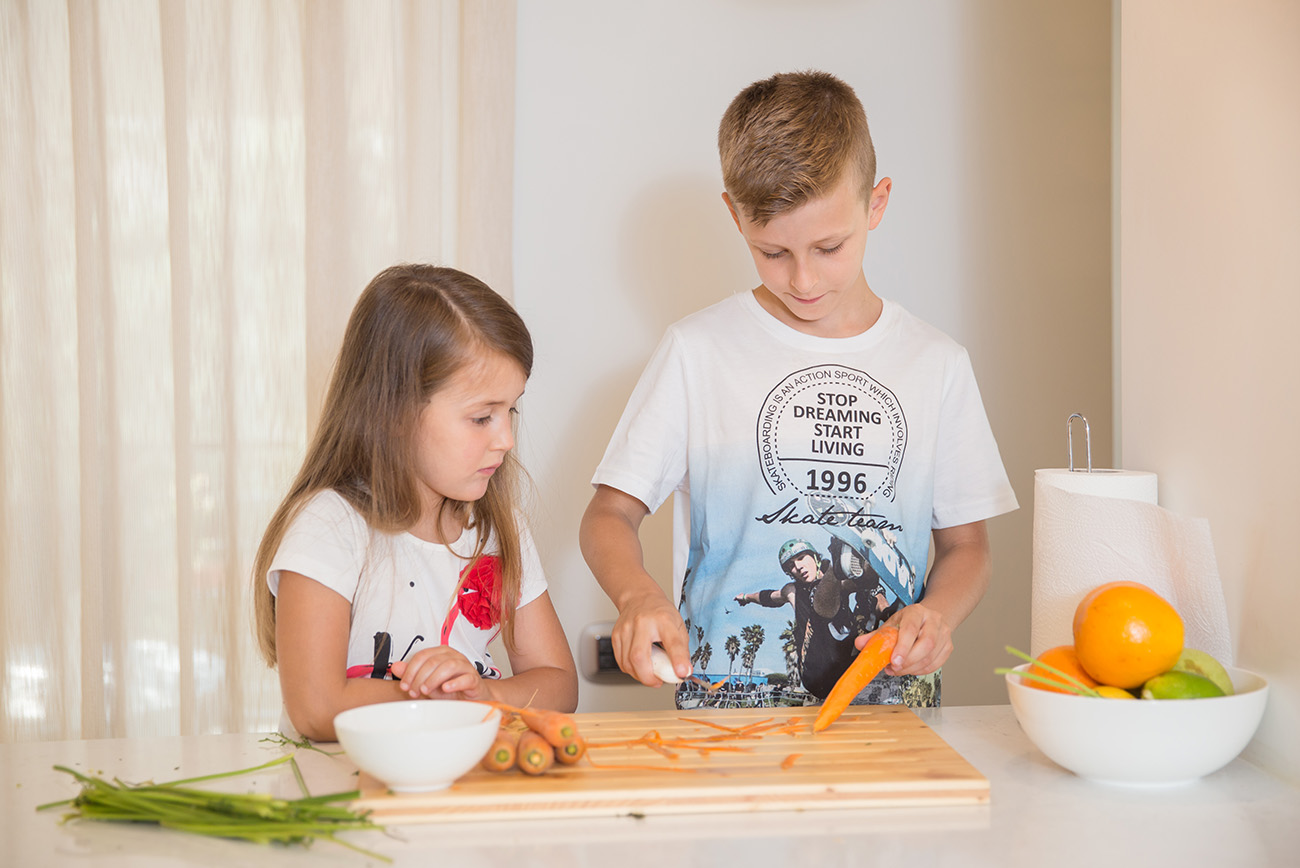“We are what we eat “– this statement is so short but so right and it means so much. Eating is a much debated and sensitive topic amongest parents, that I decided to pay more attention to it. Starting from this article, there will be a series of posts on my blog regarding health, good food, balanced menu for children and the whole family. I will take topics such as choosing healthy food for the family and preparing easy meals for children. We will be talking about picky eaters and rules at the table in the family with kids. I hope you will enjoy it as much as I am!
Today we look closer at this area of life and health – food. I’m curious to find out what your family’s relationship with food is. What’s your attitude. How do you assess your children’s health? Do you put attention for what you eat and how? We as family we try to eat healthy … I strongly believe that what we eat, is who we are.
Children are copying almost everything we do, good and bad things. The same regarding the food. If we eat junk food, our children will do the same. Do we want this for them? Of course not! We can’t say that difficult or picky eaters are always a product of their upbringing. I do however think that very often, our own attitude to and relationship with food is of an enormous influence on our children.
My own children happen to be very good eaters. They are interested in food, they try new things, and are not overly picky or fussy. Probably my husband and I have partly been lucky, and we’ve partly been doing some things right.
Let’s take in consideration our family’s health from what we EAT in first perspective! What exactly does it mean that the menu is balanced and full of value?
If the healthy food is so important, what we should be putting into shopping cart daily?I encourage you to focus on the basics first.
- Vegetables and fruits. Both in Polish guidelines and those developed by scientists from the Harvard University for example, vegetables with fruit should be the basis of a menu, but remember: vegetables should be more than fruit!
- For our diet to be balanced, it must also provide proteins, carbohydrates and fats.
These are the basis that’s why are in the top on the list.
How to choose them? Try to eat seasonal, fresh food and buy from local farmers. Those have more vitamins beyond the others. They have more minerals and ingredients, are tastier and of course, less expensive!
In this cold and rainy period of the year, when fresh food could be less available, don’t be afraid of choosing frozen food. Freezing is a process which doesn’t cause high loss of nutrients, so this is a very good choice!
- Besides veggies and fruits, what we always need to buy are cereal products such as bread, oatmeal, rice, groats…
- Bread – choosing a good bread can be a challenge! Always check its composition. The shorter the list of ingredients, the usually better (this rule applies to all products). Ideally, the ingredients for bread is limited to leaven, flour, water, salt. Some breads have an addition of grains, seeds and it is also ok. Watch out for breads that only “pretend” whole-grain! Check if the composition has no caramel and all kinds of malts. I do not think I need to add that there should be no space in your basket for baked goods such as brioches, croissants or sweet rolls.
- If you don’t have any problems with intolerance or milk allergy, you should put in your menu also kefirs, white cheeses, natural Make sure that your diet does not lack daily products (curd, mozzarella, natural yogurt), which are not only a good source of protein but also provide calcium that affects our bones. Remember not to buy fruit yoghurts! A colorful packaging of yoghurts for children are attracting, but what they hide inside for real? A small amount of yoghurt is mixed with some number of products pretending to be fruits and all is usually masked with artificial colors and aromas. Also, it’s worth buying natural yoghurts with live bacterial cultures. Probiotic bacteria have a beneficial effect on your intestines, but also on your entire health.
- Complete your shopping for meat and eggs. In case of eggs, it is best to choose those with symbol “0” or “1”.
- Remember about the fish! Fish is a rich source of omega-3 acids, so try to eat them at least twice a week in your family. Minerals and acids that the fish contains, are crucial for developing brain of the children.
- Other products that should not be missing from your shopping list are legumes such as lentils, chickpeas, tofu, beans… They’re not only the source of protein, but also fiber!
- And finally: healthy fats! I encourage you to reach for nuts, seeds, linseeds, olives, avocado. If you want, you could also buy a bitter chocolate (minimum 70% cocoa) and natural honey.
You probably know already, that if you want to eat healthy, you should limit the SALT and SUGAR. Just from now, stop buying them and instead reach for natural spices, herbs that will turn the taste of your dishes into a natural and *above all, healthy way!
You can buy, for example: basil, rosemary, thyme, cinnamon, garlic, nutmeg, marjoram, mint, pepper, herbs de Provence… I assure you: It will taste delicious!

Below I list products I am using in particular when planning healthy meals for my family:
- Vegetables
Deciduous: lettuce, for example, ice, butters, arugula, spinach, parsley
Brassica: broccoli, kale, Brussels sprouts, cauliflower, white cabbage, red, Chinese
Onions: garlic, onion, leek, chives
Root: beetroot, parsley, carrot, root celery
Other: tomato, asparagus, pepper, cucumber, pumpkin, zucchini, bean sprouts, sunflower, radish, eggplant - Fruit
Black berries, blueberries, banana, peach, pomegranate, strawberries, raspberries, pears, apples, plums, grapes, cherries, apricots, peaches, nectarines, kiwi, lime, lemon, watermelon, pineapple, avocado. - Cereal products
Millet, buckwheat, pearl barley, quinoa, brown, wild, amaranth
Whole-grain pasta
Whole grain flour, wholemeal, rye, spelled, oat, millet
Wholemeal whole wheat bread
Oatmeal and rye flakes - Leguminous vegetables
Chickpeas, lentils, beans, soybeans, green peas, broad beans - Dairy products
Natural yogurt, kefir, buttermilk, cow’s milk (or vegetable enriched in calcium), feta cheese, mozzarella, semi-fat curd cheese - Eggs
- Fish
Halibut, salmon, cod, mackerel, trout, sardines, herring, sole, shrimps - Meat
Chicken, turkey, lean beef - Nuts, seeds and grains
Almonds, walnuts, hazelnuts, Brazilian, cashews
Pumpkin seeds, sunflower, sesame, linseed - Fats
Cold pressed rapeseed oil, olive oil, linen oil - Drinks
Do you feel tired without any good reason? Drink water as much as you can!
The first thing is WATER! One of the earliest signs of dehydration is the feeling of tiredness. Remember to drink at least 1.5-2 liters of fluid every day, ideally spreading them out throughout the day. Do you already carry a bottle of water ALWAYS with you? If your children have had an intensive day or were very active in sports, or it was very hot on a given day, remember to increase the amount of fluids consumed.
Often, we take for granted that if everything is apparently ok with our health, we might put our worries away. Sometimes it’s too late for the change. Seeing my children’s health as a priority, I know I won’t regret because it’s a long-term investment!
What we eat has enormous impact on our health, hormonal balance, body resistance and even…our good mood! Let’s make this effort starting from today, choose good and healthy food from now forever and put your family’s health in the first place!
Good luck and … Enjoy!



